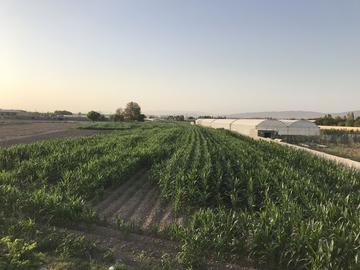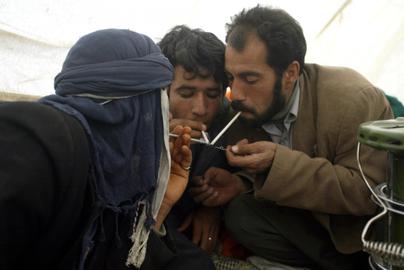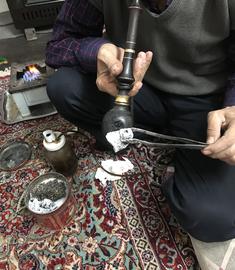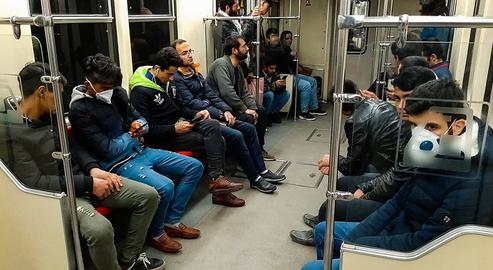The illicit drugs trade in Iran has shaped countless lives, exacerbated by punitive and misguided policies that have left some of society’s most vulnerable in the cold. In an exclusive new series for IranWire, academic Dariush Farahani lifts the lid on an under-reported contemporary crisis.
The aim of this series is to provide an insight into the drugs trade in Iran, including the impact of government policy on the drugs market, and to give a voice to marginalized communities affected by drugs that have been demonized in the media and public discourse.
Across the world and not least in Iran, drug users have been criminalized, stigmatized and treated as sick and malformed elements on the margins of society — a stance that strips them of their humanity and justifies harsh interventions into their lives. In recent years the so-called global “War on Drugs” has been questioned by an increasing number of actors. New human-centered and human rights-oriented policies and interventions are urgently needed to protect the rights of these individuals, and to prevent drug policy from further exacerbating violence, insecurity, and poor health outcomes in affected communities.
This series brings the global drug policy debate to Iran. We begin with an exploration of global drug policy before examining Iranian domestic drug policy in closer detail. Follow-up articles take in the breadth of drug users’ lived experiences in Iran and the haphazard management by government and civil society actors, based on interviews with people in Iran affected by drugs, be it as a user of opium, heroin or methamphetamine (shisheh), or by their involvement in the production, trafficking or distribution of illegal substances.
A powerfully addictive substance that breaks up families – or a traditional, benign source of pleasure? In his latest article for IranWire, Dariush Farahani encounters two groups whose attitudes to drug-taking are worlds apart.
At a university hospital in northern Tehran, a contact has set up a meeting with several colleagues who are former drug users. These men are the drivers and caretakers of the hospital doctors’ and professors’ cars. We meet in a back office, behind one of the buildings where surgery is performed.
The first two are former opium and shisheh (methamphetamine) users, who both ended up using methadone in order to quit. Methadone and other forms of opioid substitution therapy (OST) have been a life-saving intervention for millions around the world. But these methods have also attracted criticism, particularly from drug users forced to take methadone rather than “softer” opiates such as opium.
During our covert meeting at the hospital, the men open up about the horrors of addiction – and of recovery through the sanctioned methods.
Shervin began using drugs in 1991, aged about 26. He became “infected”, he said, by smoking cigarettes before moving onto opium: an addiction that would last for 17 years.
“It becomes the air you have to breathe,” he says, “the food that you have to eat, otherwise you starve. There are times when you can’t get a hold of drugs and your whole internal system collapses; your nerves can’t take it.
“I only used traditional drugs. But my neighbour smoked shisheh and one day, he cut off his father’s head. We beat him with a shovel to restrain him until the police arrived. They executed him in the end.”
Shervin used methadone as a substitute but found it hard-going. “You want to find something else to fill the hole,” he says. “When quitting methadone I felt even worse than quitting opium. I drank methadone syrup for less than one year.
“There were many difficulties that made me stop: family problems, unemployment and so on. In the end, I gave away a lot of good days of my life to drugs. I keep wishing it had been fewer.”
Armin, a colleague, agrees that shisheh users are prone to outbreaks of violence. He has also reduced his drug intake to half a tablet of methadone per day, but said it is becoming expensive – 13 tablets formerly cost just 40,000 toman, but have gone up in price – and is difficult to break away from. “It gives a temporary calm,” he says. “If I don’t take my methadone, it’s like withdrawing from drugs.
“Quitting drugs feels like dying a thousand times over. All of your body hurts, you can’t sleep; even with the strongest sleeping pills you can’t sleep. You try cut down on your use, but you can’t until there is no reason to continue.”
The men discuss the impact of addiction on their family lives. For his part, Armin isolated himself. “My family would say let’s go to the park,” he says. “I told always told them that I didn’t feel like it. Someone going after these things gives up family.”
“It makes everything so difficult for your family,” Shervin adds, “because you are always on the lookout for more drugs.”
Both have theories on why it is so easy to become ensnared by drug addiction in Iran. For Armin, who was once fined 700,000 toman by police after being kept in custody for two weeks, drugs began as an inexpensive way to have fun. “It was a small expense at first,” he says. “There is no other way for us who do not have any money to have a good time in Iran.
“If you go to prison, they sell drugs there as well! There are different gangs in prison who advertise. How do all these drugs get into the prisons?”
Shervin says: “Ultimately, the drugs are imported by the elite themselves. We call them mafihaye hokomati: they buy the courts out. Our criminal justice system is corrupt.”
Traditional Opium Users: "It Makes Life Longer, I Promise You!"
After speaking to these two men, I move on to a setting that feels a world away: a farmhouse outside of Tehran. The owner, Kamran, has invited me to visit along with several of his friends, all of whom are at least 60 years of age. Kamran grows various things here, including cucumbers, aubergines, and other vegetables. He has constructed a small “recreation house” on the land which serves as a meeting point for older gentlemen in his village. They gather here at least once a week, to play some cards, talk - and smoke opium.
When I arrive, Kamran shows me a home-made “bong” used to smoke shireh: refined opium. The bong is a basic glass jar with a lid, through which a long plastic tube is used for inhaling smoke, not dissimilar to a water pipe. With the long tube in his mouth, Kamran shows me how to inhale the smoke. The “bong” makes a gurgling sound from the water. This is where it gets its name: “Gholgholi”, “bubbling” in Farsi.
As Kamran is showing me the bong and his various vafoors, or opium pipes, it strikes me that I have now experienced almost the full spectrum of drug use in Iran. Though the government response to all drug users is the same, their lived experiences are completely divergent. The one-size-fits-all approach is unhelpful and has failed to address the deep-rooted causes of substance abuse. Unruly drug users are locked away in forced treatment camps across Iran, with authorities ignoring the fact that a sizeable population consume drugs in a controlled and even responsible manner. It is one of the few pleasures of those who cannot afford dining out at the increasingly expensive restaurants in Tehran, or going to the cinemas and upper-class malls that have spread across the more affluent areas of big cities.
To underscore the point that not all opium use is bad, Kamran tells me about his relative, a regular opium smoker of more than 50 years who lived to the age of 90.
“It was controlled,” he says. “If you can control your opium use it is truly something amazing. It makes life longer, I promise you!’
The men discuss a mutual friend who works in the Gulf in the petrochemical industry. Sometimes this friend is away for months at a time. When abroad, he does not smoke any opium at all, both due to the risk of a criminal penalty and the fact that it is so hard to come by. But when he returns to his village, he smokes vast quantities of opium and shireh.
“The environment is very important,” says Javad, one of those in attendance. “When we are here in Varamin and stop smoking opium, for some it can be on their minds constantly – because they know there is more right there.”
Meysam, another elderly acquaintance, starts talking about money, the cost of goods and the economy. Kamran exclaims: “Ah, stop your jabbering now! Why talk about something that we don’t have anyways [money]?”.
He is visibly distraught by the current state of the economy. The group lambast the government for its failed policies and 40 years of misrule. “The Islamic Republic is heading towards suicide,” Javad says, and the rest of the men agree.
Whilst Meysam continues talking about the economy, Kamran takes me aside to talk about the impact of opium on sex. “When you smoke, you have all the control in your hand,” he says. “You know when sometimes you cannot control yourself? With this it is different. If you want to have pleasure for two hours, you can. It is amazing.”
Sex is a highly delicate and stigmatised topic in Iran. But the matter has come up frequently among drug users: from regulars at the open-air drug markets of Tehran to the home of Saeed, the government employee and ex-opium smoker now addicted to methadone. Many have told me they use drugs in conjunction with sex, particularly where they are worried about how it is supposed to be, or for performance-related issues.
Two new arrivals, Vahid and Ahmad, join the group in the small room. Ahmad is in his mid-40s and has just been released from prison for forgery and fraud, pending trial. He was formerly a heavy shisheh user who would forge invoices from a company that built roads for the municipality, pocketing the difference to pay for his expensive habit. After protracted negotiations between Ahmad’s brothers and the company, the proprietor agreed to drop the charges. But Ahmad’s crime of forging an official stamp is still being prosecuted by the state, and his house has been put up for bail ahead of the court proceedings. He is visibly depressed.
The men’s conversation turns to politics, the Iranian rial, poetry and society at large as they drink tea and smoke together. This form of opium consumption is clearly a facilitator for vivid discussions. “Our talk becomes so much more beautiful when we sit here and smoke opium together,” one of them says. “Besides, the great poets smoked opium as well!’
Jokes are exchanged about the value of the rial. “The other day,” Javad says, “the other day, I was paying for something and I didn’t understand the difference between a 1,000 toman and 10,000 toman bill – there is no difference between them anymore.”
They also discuss a recent surge in robberies and thefts. “Nowadays these robbers on motorcycles drive up next to fancy cars, like a Mercedes-Benz, and pull out a knife,” Kamran says. “Usually they target women. They knock on the window of the car, motioning with the knife, and ask the driver, ‘Khat chegadr?’: ‘How much will you pay me not to knife your car?’.”
The men discuss who is at fault for this: the robber, or the person in the Benz. They all agree – it is the person in the Benz’s fault.
Meysam opines: “With this economy, with this level of inequality, you are asking for it. Besides, people who can afford a Benz that costs billions of toman must either be children of the religious elite, or in some other way have had a serious amount of ‘parti bazi’: nepotism.”
As Ahmad steps out of the room, they discuss his fate again. “The problem is that everyone wants to live a good life,” Javad says. Motioning above his head, he adds: “The problem is jumping from step one of the ladder to – up here.”
All of the men in this room have their own theory of addiction. Javad claims that shisheh and cannabis produce a “brain addiction”, as opposed to the “body addiction” he believes is brought on by opium. Many Iranian drug users have expressed similar hypotheses.
Two Worlds Apart
The men also encourage each other to smoke more. This could in part be spurred on by the Iranian socio-cultural concept of “tarof”: in which one must offer a gift, favour, or hospitality several times accepting a “no” answer, while the would-be recipient must decline at least three times before they can accept. Moreover, if you are being offered, you have to decline several times before you can accept the item. This can lead to confusion, but among these men it is clear that “no” is not taken for an answer when they coax each other into “just another puff”. And so over the hours we sit together, as they use up most of the opium brought to the gathering that evening.
Whether or not these men’s drug use should be considered a “problem” it is not my place to say. No outside spectator would have an easy time discerning whether or not they are engaging in a harmless recreational activity or slowly becoming “hooked”. Ultimately, the laughter, enjoyment, and vivid discussions they enjoy on a weekly basis must count for something, particularly in an environment that could otherwise feel hopeless.
Next in the series: In an explosive conclusion to the Drugs in Iran series, a group of Tehran-based drug policy and treatment experts offer their take on corruption, profiteering and the outdated official stance to Iran’s so-called “drugs problem”.
Also in the series:
Drugs in Iran: A New IranWire Series
Drugs in Iran: A Meeting With Narcotics Anonymous
Drugs in Iran: Hopelessness, Drug Use and “Parti Bazi”
Drugs in Iran: The "Moratorium" on the Death Penalty
Drugs in Iran: Selling Heroin After the Revolution
Drugs in Iran: Inside the Government-Sponsored “Treatment Camps”
visit the accountability section
In this section of Iran Wire, you can contact the officials and launch your campaign for various problems



























comments